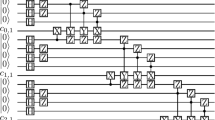Abstract
We present a general theory of entanglement-assisted quantum convolutional coding. The codes have a convolutional or memory structure, they assume that the sender and receiver share noiseless entanglement prior to quantum communication, and they are not restricted to possess the Calderbank–Shor–Steane structure as in previous work. We provide two significant advances for quantum convolutional coding theory. We first show how to “expand” a given set of quantum convolutional generators. This expansion step acts as a preprocessor for a polynomial symplectic Gram–Schmidt orthogonalization procedure that simplifies the commutation relations of the expanded generators to be the same as those of entangled Bell states (ebits) and ancilla qubits. The above two steps produce a set of generators with equivalent error-correcting properties to those of the original generators. We then demonstrate how to perform online encoding and decoding for a stream of information qubits, halves of ebits, and ancilla qubits. The upshot of our theory is that the quantum code designer can engineer quantum convolutional codes with desirable error-correcting properties without having to worry about the commutation relations of these generators.
Similar content being viewed by others
References
Ollivier H., Tillich J.-P.: Description of a quantum convolutional code. Phys. Rev. Lett. 91(17), 177902 (2003)
Ollivier, H., Tillich, J.-P.: Quantum convolutional codes: fundamentals. arXiv:quant-ph/0401134 (2004)
Grassl, M., Rötteler, M.: Noncatastrophic encoders and encoder inverses for quantum convolutional codes. In: IEEE International Symposium on Information Theory (quant-ph/0602129) (2006)
Grassl, M., Rötteler, M.: Quantum convolutional codes: encoders and structural properties. In: Proceedings of the Forty-Fourth Annual Allerton Conference, pp. 510–519 (2006)
Grassl, M., Rötteler, M.: Constructions of quantum convolutional codes. In: Proceedings of the IEEE International Symposium on Information Theory, pp. 816–820 (2007)
Forney, G.D., Guha, S.: Simple rate-1/3 convolutional and tail-biting quantum error-correcting codes. In: IEEE International Symposium on Information Theory (arXiv:quant-ph/0501099) (2005)
Forney G.D., Grassl M., Guha S.: Convolutional and tail-biting quantum error-correcting codes. IEEE Trans. Inf. Theory 53, 865–880 (2007)
Aly, S.A., Grassl, M., Klappenecker, A., Roetteler, M., Sarvepalli, P.K.: Quantum convolutional BCH codes. In: 10th Canadian Workshop on Information Theory (arXiv:quant-ph/0703113), pp. 180–183 (2007)
Aly, S.A., Klappenecker, A., Sarvepalli, P.K.: Quantum convolutional codes derived from Reed-Solomon and Reed-Muller codes. arXiv:quant-ph/0701037 (2007)
Wilde, M.M., Krovi, H., Brun, T.A.: Convolutional entanglement distillation. To appear in the International Symposium on Information Theory, arXiv:0708.3699, Austin, Texas, USA June (2010)
Wilde M.M., Brun T.A.: Entanglement-assisted quantum convolutional coding. Phys. Rev. A 81, 042333 (2010)
Wilde, M.M., Brun, T.A.: Unified quantum convolutional coding. In: Proceedings of the IEEE International Symposium on Information Theory (arXiv:0801.0821), pp. 359–363. Toronto, ON, Canada, July 2008
Lloyd S.: Capacity of the noisy quantum channel. Phys. Rev. A 55(3), 1613–1622 (1997)
Shor, P.W.: The quantum channel capacity and coherent information. In: Lecture Notes, MSRI Workshop on Quantum Computation (2002)
Devetak I.: The private classical capacity and quantum capacity of a quantum channel. IEEE Trans. Inf. Theory 51, 44–55 (2005)
Hayden P., Horodecki M., Winter A., Yard J.: A decoupling approach to the quantum capacity. Open Syst. Inf. Dyn. 15, 7–19 (2008)
Klesse R.: A random coding based proof for the quantum coding theorem. Open Syst. Inf. Dyn. 15, 21–45 (2008)
Horodecki M., Lloyd S., Winter A.: Quantum coding theorem from privacy and distinguishability. Open Syst. Inf. Dyn. 15, 47–69 (2008)
Hayden P., Shor P.W., Winter A.: Random quantum codes from Gaussian ensembles and an uncertainty relation. Open Syst. Inf. Dyn. 15, 71–89 (2008)
Poulin D., Tillich J.-P., Ollivier H.: Quantum serial turbo-codes. IEEE Trans. Inf. Theory 55(6), 2776–2798 (2009)
Calderbank A.R., Rains E.M., Shor P.W., Sloane N.J.A.: Quantum error correction via codes over GF(4). IEEE Trans. Inf. Theory 44, 1369–1387 (1998)
Nielsen M.A., Chuang I.L.: Quantum Computation and Quantum Information. Cambridge University Press, Cambridge (2000)
Brun T.A., Devetak I., Hsieh M.-H.: Correcting quantum errors with entanglement. Science 314(5798), 436–439 (2006)
Brun, T.A., Devetak, I., Hsieh, M.-H.: Catalytic quantum error correction. arXiv:quant-ph/0608027, August (2006)
Grassl, M.: Convolutional and block quantum error-correcting codes. In: IEEE Information Theory Workshop, pp. 144–148, Chengdu, October (2006)
Johannesson R., Zigangirov K.Sh.: Fundamentals of Convolutional Coding. Wiley-IEEE Press, (1999)
Gottesman, D.: Stabilizer Codes and Quantum Error Correction. PhD thesis, California Institute of Technology (1997)
Shaw B., Wilde M.M., Oreshkov O., Kremsky I., Lidar D.: Encoding one logical qubit into six physical qubits. Phys. Rev. A 78, 012337 (2008)
Wilde M.M., Brun T.A.: Optimal entanglement formulas for entanglement-assisted quantum coding. Phys. Rev. A 77, 064302 (2008)
Bennett C.H., Wiesner S.J.: Communication via one- and two-particle operators on Einstein- Podolsky-Rosen states. Phys. Rev. Lett. 69(20), 2881–2884 (1992)
Wilde M.M., Brun T.A.: Extra shared entanglement reduces memory demand in quantum convolutional coding. Phys. Rev. A 79(3), 032313 (2009)
Kremsky I., Hsieh M.-H., Brun T.A.: Classical enhancement of quantum-error-correcting codes. Phys. Rev. A 78(1), 012341 (2008)
Author information
Authors and Affiliations
Corresponding author
Rights and permissions
About this article
Cite this article
Wilde, M.M., Brun, T.A. Quantum convolutional coding with shared entanglement: general structure. Quantum Inf Process 9, 509–540 (2010). https://doi.org/10.1007/s11128-010-0179-9
Received:
Accepted:
Published:
Issue Date:
DOI: https://doi.org/10.1007/s11128-010-0179-9



